
ABC Carnival '74
Across the Board
Baloney
Bamboozle
Be What You Want
Beat The Genius
Beat The Odds (1962)
Beat The Odds (1975)
Bedtime Stories
The Better Sex
The Big Money
The Big Payoff
Big Spenders
Blank Check
Body Language
Body Talk
The Buck Stops Here
Bullseye
Call My Bluff
Card Sharks (1996)
Casino
Caught in the Act
Celebrity Billiards
Celebrity Doubletalk
Celebrity Secrets
Celebrity Sweepstakes
Chain Letter (1964)
The Challengers (1974)
Change Partners
Child's Play
The Choice Is Yours
Combination Lock (1996)
Comedy Club
Concentration (1985)
The Confidence Game
Cop Out
Countdown (1974)
Countdown (1990)
The Couples Race
Crossword
Decisions, Decisions
Dollar a Second
Duel in the Daytime
The Fashion Show
Fast Friends
$50,000 a Minute
Finish Line (1975)
Finish Line (1990)
Get Rich Quick
Going, Going, Gone!
Head of the Class
High Rollers
Hollywood Squares (1965)
Hollywood Squares (1985)
The Honeymoon Game
Hot Numbers
Hot Potato
House to House
How Do You Like Your Eggs?
Jackpot (1984)
Jeopardy (1977)
Jokers Wild
Jumble
Key Witness
Keynotes (1986)
King of the Hill
Let's Make a Deal (1963)
Let's Make a Deal (1990)
The Love Experts
M'ama Non M'ama
Match Game (1962)
Match Game (1973)
Match Game (1990)
Match Game (1996)
MatchGame (2008)
Mindreaders
Missing Links
Monday Night QB
Money Words
Money in the Blank
Moneymaze
Monopoly (1987)
Nothing But the Truth
Now You See It (1986)
Oddball
100%
PDQ
Party Line
People On TV
Play For Keeps
Play Your Hunch
The Plot Thickens
Pot O' Gold
Pressure Point
The Price Is Right (1972)
Pyramid (1996)
Pyramid (1997)
A Question of Scruples
Quick as a Flash
Razzle Dazzle
Riddlers
Run For The Money
Says Who?
Scrabble (1990)
Second Guessers
Second Honeymoon
Sharaize
Shoot for the Stars
Shoot the Works
Shopping Spree
Show Me
Showoffs
Simon Says
$64,000 Question (2000)
Smart Alecks
Smart Money
Spellbinders
Spin-Off
Split Decision
Star Cluster
Star Play
Strictly Confidential
TKO
Talking Pictures (1968)
Talking Pictures (1976)
Tell It to Groucho
Temptation (1981)
$10,000 Sweep
Three of a Kind
Tic Tac Dough
Tie-Up
Top Secret
Twenty One (1982)
Twenty Questions
Twisters
Up and Over
The Waiting Game
We've Got Your Number
What Do You Want?
What's On Your Mind
Wheel of Fortune
Whew!
Whodunit
Whose Baby
Wipeout
Word Grabbers
Write Your Own Ticket
You Bet Your Life (1988)
You Bet Your Life (1991)
You're Putting Me On
Show a Random Pilot
Show Unreviewed Pilots
Bob Stewart Flow Chart
Talking Pictures (1968)
Producer: Hatos-Hall
Host: Allen Ludden
Announcer: Jay Stewart
Celebrities: Carol Burnett, Angela Cartwright, Lorne Greene, Stubby Kaye, Peter Lawford, Ann Miller, Agnes Moorehead, Tom Smothers, Jan Sterling, Paul Winchell
Taping Info: February 25, 1968, CBS Television City, California
Made it to Air: No
Other Pilots: A prior one taped in 1967 and a later one in 1976.
Availability: Some traders will have it, it is also available through Kinevideo. UCLA has all three pilots.
Hollywood Squares has ushered in a new wave of panel shows, those where you can have many celebrities. Over at CBS, which only has the aging To Tell the Truth on their daytime lineup, could be desperate for a new show. CBS originally passed on the Squares in 1965, so this could be their chance to atone. But, it's Fred Silverman at the head of CBS, so this show really didn't have much of a chance.
So, Allen Ludden, who just saw his Password hit the dust and has yet to Win With the Stars, is the host of this celebrity menagerie that features not one, not two, but ten celebrities. Featured on this episode include Stubby Kaye, Carol Burnett (probably doing Allen a favor), Paul Winchell, Agnes Moorehead, Peter Lawford (is there a pilot he won't do?), Ann Miller, Jan Sterling (who also appeared on the one and only episode of Get The Picture making her the Alison LaPlaca of game shows, I guess), Lorne Greene, Tom Smothers and Angela Cartwright.
Game play represents essentially a cross between Concentration, Eye Guess and Hollywood Squares. At the beginning of each round (there are two), nine of the ten celebrities opens up their Laugh In-like shutters (see the picture below), reveal a secret about themselves, and then closes their door. Contestants then have the fact repeated to them by Ludden, and they alternate guessing which celebrity matched that fact by calling out their number. Essentially, contestants had to remember the story that matched to the number, since which celebrity saying it was irrelevant (for now, anyway). If the player was correct, he or she earned $25. Players did not continue if they answered correctly, it always alternated. The one who didn't reveal their secret was considered the "silent picture" and was impersonating a historical character, but could still have a secret revealed by Allen. In this episode, Paul Winchell portrayed Dracula in round one and Pancho Villa in round two.
After the first round, celebrities changed numbers, and they were revealed again with a new secret. Once the second round was finished, the winner went on to the bonus game. The celebrities changed numbers again, and revealed themselves one-by-one, but this time not giving a clue. Allen then read a clue either from round one or round two followed by the contestant guessing which number belonged to that clue. If the contestant guessed correctly, the player received the amount they won in the main game added to their total. If the celebrity was guessed incorrectly, the door remained open and a contestant called out a different number. Once all ten doors were open, the game was over. A guess of all ten celebrities would have netted a contestant 10 times their main game win.
There were several problems with this game that could easily have been corrected. First, ten celebrities were too much, they probably could have gotten away with seven or eight. Second, the game moved too quickly, not allowing for witty by-play either between other contestants or Allen. Third, the celebrities are hidden behind a door for most of the show, what's the point in having a celebrity if they're seldom seen or heard? Despite that, it wasn't that bad, Allen could have hosted the XFL and it would seem classy. Looking back, CBS wasn't going to take it to their schedule since Fred Silverman hated game shows and it wasn't better than any of the eight daytime shows then on the air either ratings or quality wise (save the Barris shows).
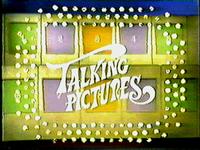 Is it Lets Make a Deal on crack??? |
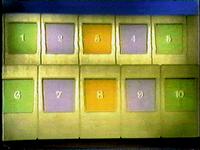 Nope, its just the 1968 pilot Talking Pictures. |
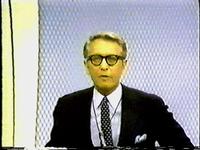 And here's your host of Talking Pictures, Allen Ludden! |
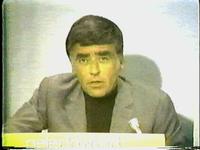 And here are the stars, first, appearing in his 211th pilot � Peter Lawford. |
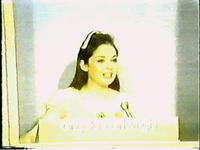 From The Sound of Music and Lost in Space, its Angela Cartwright. |
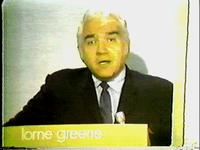 From Canada and Bonanza, its Lorne Greene. |
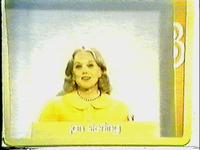 From You're In the Picture and the movie Split Second, Jan Sterling. |
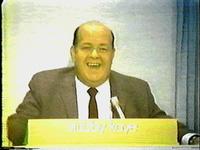 From Shenanigans and Cat Ballou, Stubby Kaye. |
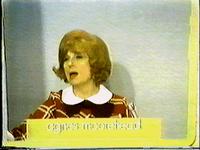 From Bewitched, Agnes Moorehead. |
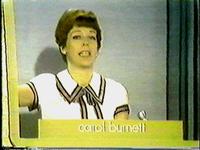 From her own show, Carol Burnett. |
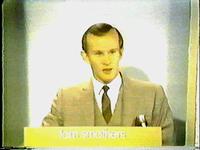 And from a recently canceled show, Tom Smothers. |
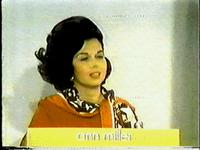 And representing Heinz soup, Ann Miller. |
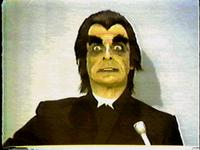 And hes no dummy, it's Paul Winchell as Dracula. |
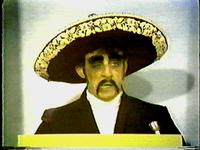 And here's Paul Winchell as Pancho Villa. Paul Winchell had a doctorate from the Acupuncture Research College. |
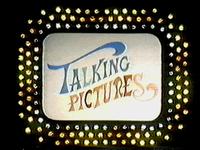 Whew, that's a lot of celebrities. Lets take a break. Oops, it's a pilot, there aren't any commercials. |
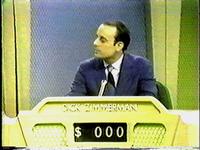 Here's one contestant. |
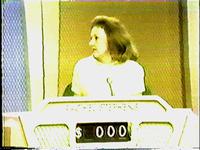 And here's the other contestant. |
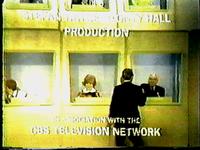 This is Jay Stewart for Talking Pictures, a Stefan Hatos-Monty Hall Production. |
This pilot has been viewed 13271 times since October 6, 2008 and was last modified on Dec 12, 2009 14:46 ET
Feedback? Contact me at usgs-pilot at the usgameshows dot net domain